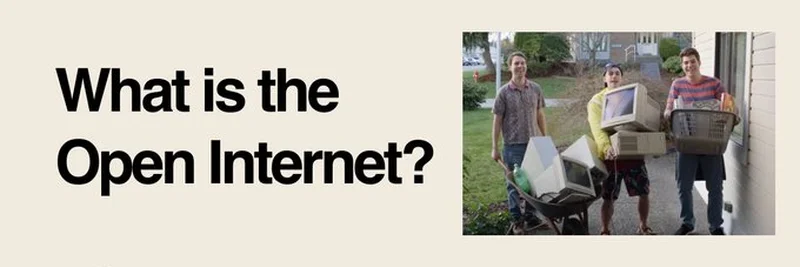Hey there, crypto enthusiasts and blockchain curious! If you’ve been hanging out in the crypto space lately, you’ve probably heard the term “Open Internet” thrown around a lot. But what does it really mean? The folks at Open Internet Clubs recently dropped a thread that breaks it down in a way that’s easy to digest, and we’re here at Meme Insider to unpack it for you. Let’s dive into this exciting concept and see how it’s shaping the future of the web!
What Exactly Is the Open Internet?
At its core, the Open Internet isn’t just a buzzword—it’s a vision for a decentralized web where you, the user, are in control. Think of it as moving away from the big tech gatekeepers (like centralized platforms) and toward a system where you own your data, money, and digital identity. The image in the tweet, showing people hauling old computer gear, is a fun nod to leaving behind outdated, controlled systems and embracing something new and empowering.
This idea ties closely to the crypto world, where decentralization is king. The thread explains that the Open Internet goes beyond just tech jargon—it’s about giving power back to the people. No more middlemen skimming value from your online interactions!
The Core Principles of the Open Internet
So, what makes the Open Internet tick? The thread highlights four key principles:
- Self-Sovereignty: You’re the boss of your own digital stuff. Your data, your crypto, your rules.
- Credible Neutrality: Everyone gets a fair shot—no favoritism or pay-to-play schemes.
- Censorship Resistance: You can transact and communicate freely without interference.
- Fairness: Equal access for all, with no gatekeepers blocking the way.
These principles are like the foundation of a house—without them, the Open Internet wouldn’t stand strong. They’re especially exciting for blockchain practitioners who want a web that aligns with the ethos of decentralization.
How Does It Work in Practice?
Okay, but how does this look in real life? The thread gives some cool examples. Imagine sending money to a friend across the globe without a bank taking a cut—thanks to crypto! Or creating your own currency with a group of pals. You can even use a Visa card to spend crypto while keeping full control of your funds. It’s all about balancing convenience with sovereignty, which is a game-changer for anyone tired of traditional financial systems.
Gnosis and the Open Internet
The thread also shines a spotlight on Gnosis, a project working to bring the Open Internet to life. They’re building a suite of products designed for everyday people, with lower fees, more control, and global access. Whether you’re a crypto newbie or a seasoned pro, this focus on real-world use cases is a big deal. Plus, they’re inviting people to join local Open Internet Clubs to get involved—check out the link in their tweet to find one near you!
Why It Matters for Meme Tokens and Beyond
At Meme Insider, we’re all about keeping you in the loop on the latest blockchain trends, including meme tokens. The Open Internet ties into this space because it supports the kind of innovation that fuels decentralized projects. As meme tokens often thrive on community-driven ecosystems, a web without gatekeepers could be a perfect playground for their growth. Plus, with self-sovereignty, creators and holders can protect their assets and identities better than ever.
Final Thoughts
The Open Internet is more than just a tech upgrade—it’s a movement toward a freer, fairer digital world. Thanks to the insightful thread from Open Internet Clubs, we’ve got a clearer picture of what’s at stake and how projects like Gnosis are making it happen. Whether you’re into crypto, blockchain, or just curious about the future of the web, this is one trend worth watching.
Ready to dive deeper? Join an Open Internet Club or explore more at Meme Insider to stay ahead of the curve. What do you think about this decentralized future? Drop your thoughts in the comments—we’d love to hear from you!



